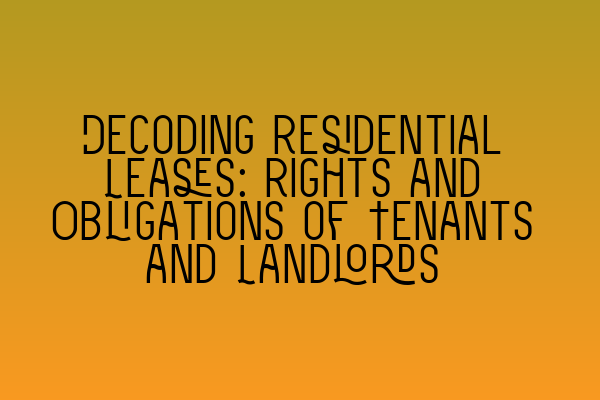Decoding Residential Leases: Rights and Obligations of Tenants and Landlords
When it comes to renting a property, understanding your rights and obligations as a tenant, as well as those of the landlord, is crucial. Residential leases can often be complex and filled with legal jargon, making it intimidating for both parties involved. In this blog post, we will decode the intricacies of residential leases, breaking them down into simple terms so that tenants and landlords can navigate their rights and obligations effectively.
1. Understanding the Lease Agreement
A lease agreement serves as a legally binding contract between the tenant and the landlord. It outlines the terms and conditions of the tenancy, including the rent amount, duration of the lease, and any specific rules or restrictions. It is essential for both parties to carefully review and understand the lease before signing it. If you have any doubts or concerns, seek legal advice to ensure clarity and protect your interests.
2. Tenant Rights and Obligations
As a tenant, you have certain rights and obligations that you should be aware of:
a) Right to Peaceful Enjoyment: Every tenant has the right to peacefully enjoy their rented property without interference from the landlord. This means that the landlord cannot enter the property without prior notice and a valid reason.
b) Payment of Rent: One of the main obligations of the tenant is to pay the rent on time as stipulated in the lease agreement. Failure to do so may result in eviction or legal action. It is important to keep track of rent payments and maintain a record.
c) Maintenance and Repairs: Tenants are responsible for notifying the landlord of any necessary repairs or maintenance required in the property. Landlords then have a duty to address these issues promptly.
d) Compliance with Rules: Tenants must adhere to any rules laid out in the lease agreement or by the landlord. These may include restrictions on pets, noise levels, or alterations to the property.
e) Right to Privacy: Tenants have the right to privacy within their rented property. Landlords should provide notice before entering the premises, except in emergencies.
For a thorough understanding of tenant rights and obligations, it is advisable to consult with a solicitor who specializes in property law. They can guide you through the legalities and ensure your rights are protected.
3. Landlord Rights and Obligations
Landlords also have rights and obligations that must be upheld:
a) Right to Rental Payment: Landlords have the right to receive the agreed-upon rent on time. Non-payment or delayed payment can result in legal action.
b) Property Maintenance: Landlords are responsible for maintaining the property to a reasonable standard. This includes addressing repairs, ensuring habitability, and complying with health and safety regulations.
c) Notice of Entry: While landlords have the right to access the property for specified reasons, such as repairs or inspections, they must provide reasonable notice to the tenant beforehand, unless in emergencies.
d) Return of Security Deposit: At the end of the tenancy, landlords must return the tenant’s security deposit, minus any deductions for damage beyond reasonable wear and tear.
e) Compliance with Landlord Responsibilities: Landlords must comply with all laws and regulations relevant to residential tenancies, including obtaining necessary licenses and certifications for rental properties.
To ensure compliance with legal requirements and to protect their interests, landlords should consider seeking advice from a property law solicitor.
4. Additional Considerations
It is worth noting that each jurisdiction may have specific laws and regulations regarding residential leases. Familiarize yourself with the relevant laws in your area to ensure full compliance. Moreover, it is always best to seek legal advice tailored to your specific circumstances for a comprehensive understanding of your rights and obligations.
In conclusion, understanding the rights and obligations of both tenants and landlords is crucial when entering into a residential lease agreement. Being knowledgeable about these rights and obligations can help prevent disputes and ensure a harmonious tenancy. For more information on related legal topics, consider checking out the following articles:
– SQE 1 Practice Exam Questions
– SQE 1 Practice Mocks FLK1 FLK2
– SQE 2 Preparation Courses
– SQE 1 Preparation Courses
– SRA SQE Exam Dates
Remember, if you have any doubts or concerns regarding your residential lease, it is advisable to consult with a qualified solicitor who specializes in property law. They can provide guidance tailored to your situation and ensure that your rights are protected throughout the tenancy.
